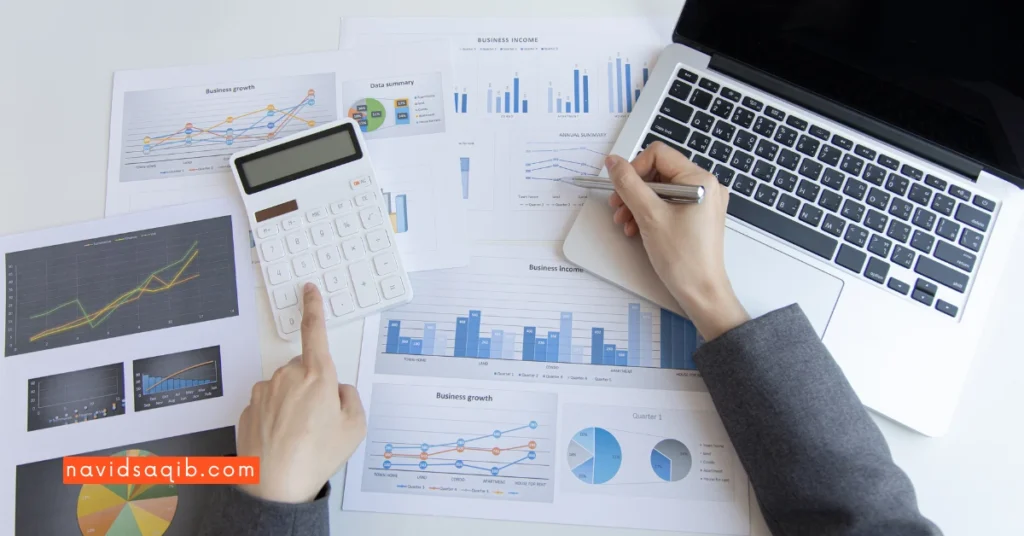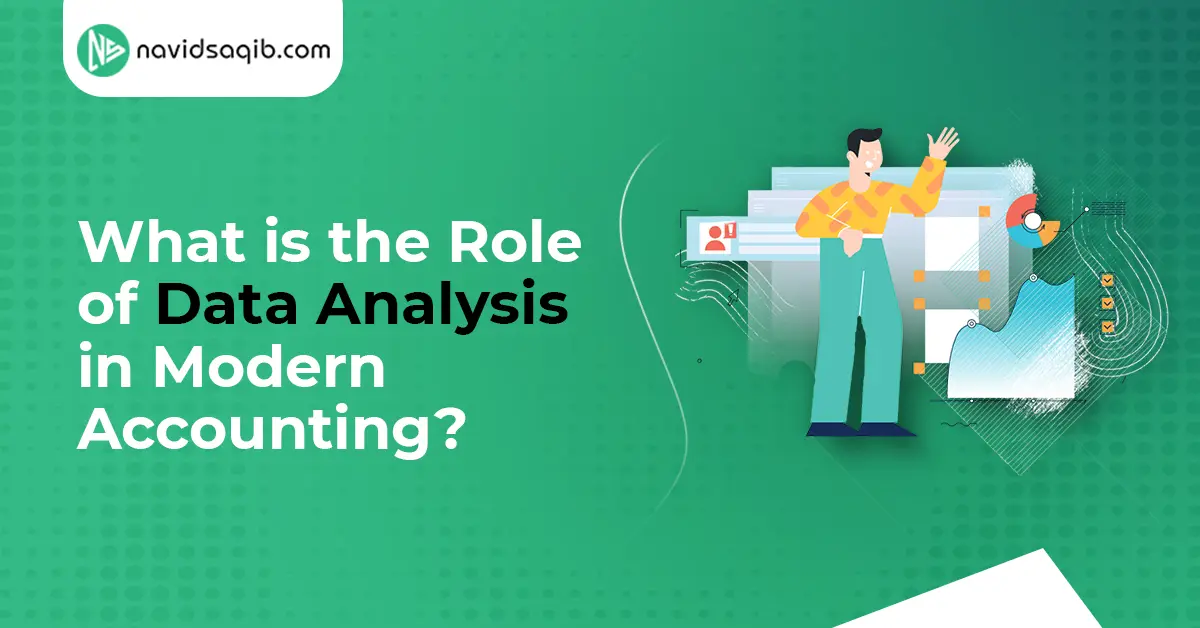In today’s fast-changing financial world, businesses must know why data analysis is important for accounting. It’s essential to stay competitive. They should integrate data analysis into accounting. It will unlock deeper insights from their financial reports. It will help them assess real-world financial positions and make better decisions.
This innovative approach boosts the business’s efficiency. It lets accountants manage a complex dataset while following evolving regulations.
Technology’s role is to reshape accounting practices. In short, it can be understated. It provides the tools to analyze trends and forecast outcomes to manage risk.
As demands for transparency rise, real-time data is a game changer. It provides reliable insights. Data analysis helps. It leads to better financial reports. These are needed for strategic planning in today’s competitive markets. What are the key benefits of the Role of Data Analysis in Modern Accounting for accountants?
Data-driven strategies use data analysis to improve operations and decision-making. They help businesses redefine their accounting practices to achieve long-term growth and sustainability.

Stay Ahead in Your Studies!
Don’t miss out on valuable resources that can help you excel in your academic journey!
Why Is It Crucial to Integrate Data Analysis into Accounting Practices?
Data analysis integration is crucial in accounting. It boosts data accuracy and improves financial management.

Companies can use advanced tools to automate complex processes. This will reduce risk, allow for scalability, and improve decision-making. They will have a reliable framework to forecast outcomes. This integration can provide insights. It will empower accountants. It will enable a precise process for data-driven decisions. These will align with the organization’s long-term goals.
It also supports modern accounting. It does this by providing evaluations and reducing risks. This reshapes opportunities for efficiency and growth in a dynamic financial landscape.
What is Data Analysis in Accounting?
Data analysis in accounting turns raw financial data into insights. These insights support decisions and improve efficiency. Utilizing advanced analytical techniques, accountants can get the benefit of monitoring real-time transactions. It also helps to streamline process improvements and can optimize financial tracking.
Accounting prioritizes precision and compliance over generic data processes. It showed that using custom data tools can ensure accurate, reliable financial statements. This is the best way to boost efficiency and survive in the financial ecosystem.
How Does Data Analysis Differ in Accounting From Other Fields?
The sector-specific analysis is key in accounting. It addresses unique challenges, like reporting accuracy and compliance with standards. The accounting field focuses on specialized applications and techniques. The other field focuses on broader strategies.
These techniques help the accountants to meet legal and financial requirements. This task needed unique frameworks and insights to navigate financial laws. It helps the business stay competitive and compliant in today’s fast-growing economy.
How Has Data Analysis Evolved in Accounting Over Time?
Historical trends and the digital shift reshape accounting’s data analysis. It utilizes and revolutionizes traditional accounting practices over time. As the world grows fast, technology advances. Modern tools reflect this evolution. these tools provide help in tracking and analysis.
This is a great help in today’s tech world. It can help businesses adapt to changing market trends. By using predictive tech and insights, businesses can make better decisions. Data-driven evolution is growing fast. It is raising the analytics role to empower accountants. It helps them navigate a complex data set with precision and efficiency.
Importance of Data Analysis in Accounting
Data analysis is vital. It ensures accurate data for financial reporting and compliance. It meets accuracy benchmarks. It avoids costly errors that can disrupt the system and lead to regulatory penalties.

leveraging precise analysis business can enhance audit readiness and increase credibility with stakeholders. This ensures the alignment of financial statements with strict regulatory standards. The focus on precision enables reliability in accounting processes. It helps to create solid foundations for wise decision-making and long-term planning.
Why is Data Accuracy Crucial in Accounting?
Integrating rich data practices ensures data accuracy and supports trust-building in professional relationships. Accountants can navigate the tough financial landscape if they use error prevention well.
This helps to measure and align with the protocols. Focusing on trust-building reshaped data analysis. It became the foundation of modern accounting. It enables the business to meet its goals and maintain transparency with accountability
How Does Data Analysis Improve Decision-Making?
Data analysis is key to better strategic planning. It provides insights that can improve outcomes and strategies. It is a data-driven framework. It helps financial leaders make better decisions.
It provides this because it’s based on solid evidence instead of just assumptions. This approach helps create effective scenario planning. It lets businesses assess their goals and adjust their strategies to meet them.
Data analysis becomes key due to these metrics. They help leaders measure their success and the decisions that led to it. It ensures financial leadership by providing actionable intelligence that thrives in long-term success.
What Role Does Data Analysis Play in Auditing?
Data analysis helps the business audit itself. This is vital for transparency and accountability. It’s key to ensuring the reliability of month-end or yearly financial statements. It helps reduce false activity by providing fraud detection. So, internal controls can be better at spotting and managing risks.
Advanced audit tools can help companies analyze data. They can automate tasks, identify and control risks, and improve compliance. This ensures regulatory requirements align with their goals. In forensic accounting, data analysis lets auditors deeply understand financial records. They can then provide precise insights for accurate audit reports.
How Does Data Analysis Aid in Risk Management?
Data analysis helps companies find and fix threats before they cause damage. It acts as a powerful tool in risk management to take care of the prospective dangers.
Other data analysis techniques, like predictive analytics, help the business. They improve forecasting and risk management. Leveraging these techniques can create a clear path to achieving financial stability.
Risk analysis lets the business create a safety net. It can detect threats early with dynamic risk analysis. It makes the better preparation for taking care of uncertain events.
This plan to minimize disruptions is proactive. It can empower companies to stay ahead in a fast-changing business landscape.
Tools and Techniques for Data Analysis in Accounting
Data analysis is a complex process that includes a variety of tools and platforms. In accounting, it provides a streamlined process.
These tools deliver reliable, accurate insights. The tools include apps like Excel, QuickBooks, and SAP. These tools are widely used. They help businesses handle complex datasets and generate detailed reports.
What Tools Are Commonly Used in Accounting Data Analysis?
They let accountants work in the worst conditions to manage financial data. They offer diverse functions like tracking market trends and automation of repetitive tasks. Plus, they can enhance accessibility and collaboration to ensure seamless workflows. By providing the integration of financial software with cloud solutions
These emerging technologies are revolutionizing the field. They bring automation and advanced reporting. These features can make data analysis faster and more accurate. Accountants are using these innovations to improve decision-making. They help with complex financial tasks.
These cutting-edge tools boost business growth by providing operational efficiency. They allow real-time insights. Companies can react to market changes and stay competitive.
Which Techniques Are Essential for Effective Accounting Data Analysis?
Data analysis in accounting is effective. It uses key techniques to find actionable insights. Many core approaches, like forecasting and clustering, help the business. They find charts, patterns, and trends, including financial ones.
To process complex information, we use advanced analytics tools. They support data visualization and statistical analysis. They also provide valuable actionable insights. Machine learning helps the business analyze large datasets and predict better. it provides informed decision-making by optimizing effective financial strategies.
Challenges in Implementing Data Analysis in Accounting
During data analysis in accounting, accountants face many barriers. These can inhibit seamless integration. Analytics tools help organizations, especially small firms.
They aid in deciding on investments in transformative technology. These tools prevent the business from facing high-cost challenges while adopting advanced analytics.
Also, it can be hard to optimize new systems. There are big knowledge gaps in the team’s learning curves.
What Are the Common Barriers to Adopting Data Analytics in Accounting?
Teams can resist change. They may hesitate to adopt modern methods. This can slow down the adoption process and hinder innovation.
To overcome these hurdles, businesses can attempt strategic planning and commitment to change. Team adaptability is crucial for flawless training. It will ensure that employees have the right equipment and skills to use analytics.
So, incorporating the process changes can help to promote a culture of collaboration. It will fill the gaps. Then, the business can embrace data-driven solutions in today’s fast-changing financial world.
How Can Organizations Ensure Data Security in Accounting Analysis?
Data security is an important factor in accounting. It requires an accounting analysis to use strong measures. These include advanced encryption and comprehensive cybersecurity protocols.
Businesses must prioritize GDPR compliance to protect their sensitive financial information.. They should use secure platforms. Apply data privacy with proactive risk management. It will help them to create strict policies for safe analysis. It will also help them to meet strict regulations.
Organizations can protect sensitive data and their market trust. They can do this by using an accountability culture and protective technology.
Future of Data Analysis in Accounting
The future of data analysis in accounting is quite bleak due to new trends and innovations. these factors emphasize and reshape the fact of how financial professionals work. Businesses are using big data to gain deeper insights. This helps them make better decisions.
What Emerging Trends Will Shape the Future of Accounting Data Analysis?
AI integration and blockchain are improving system security and transparency. They also automate reporting to boost efficiency. These are helpful advances. They are paving the way for scalability in accounting. It helps the business to handle large, complex data. It can then gain valuable insights.
Industries nowadays employ real-time monitoring and better futuristic tools. This changes accountants’ roles. They will focus on strategic advice and analytics. It ensures smooth operations. It also drives the company’s strong position in a competitive market. It also helps to provide accurate forecasts.
This is due to the use of cutting-edge solutions in financial systems. This makes data analysis in accounting more powerful and useful. It’s vital for long-term success.
How Can Accountants Stay Ahead in a Data-Driven Era?
To stand out in today’s data-driven era, accountants must develop their skills. They should also keep learning to stay competitive. If they pursue relevant certifications, it will expand their knowledge in the field. They should also embrace new technologies, like analytics and automation. This will help them to adopt many evolving roles.
They can stay valuable in the market by upskilling and building adaptive skills. It will keep them on track in today’s fast-changing landscape. This dedication lets professionals grow. It boosts their skills and opens new opportunities. It empowers them to navigate innovation and get sustained career growth.

Stay Ahead in Your Studies!
Don’t miss out on valuable resources that can help you excel in your academic journey!
Conclusion
Data analysis is vital for accounting. It ensures data accuracy, boosts efficiency, and aids decision-making. Its importance lies in its game-changing role.
Data analytics integrations can boost accountants’ success. They should use data analytics daily. They can navigate through complex industry demands confidentially. This mix of innovation and tradition enables smarter operations. It offers effective ways to face and solve challenges.
The system’s data handling boosts and transforms accounting. It also prices the fast-evolving adoption of the new landscape. If the business uses tools that promote change, it can grow. It will not be limited.
Are you ready to take the next step now? Start today by leveraging the power of data and level up your financial strategies.
FAQs
What is the primary purpose of data analysis in accounting?
Data analysis aims to improve decision-making and accuracy in accounting. It also seeks to ensure compliance. It offers insights and optimizes processes for better financial management.
How can small businesses benefit from data analysis in accounting?
Data analysis helps small businesses. It boosts profits and improves tracking. It provides valuable insights. Using cheap tools for data analysis is better for finance. It is more scalable and cost-efficient.
What tools are best for beginners in accounting data analysis?
Tools like Excel, QuickBooks, and Wave are efficient for beginners. These tools are user-friendly. They are a great starting point for the accessible platforms. These platforms can balance ease of use with effective data analysis.
How does data analysis improve financial compliance?
Data analysis helps to enhance financial compliance. It ensures compliance with standards and regulations to improve reporting and tracking accuracy. By using data, organizations can optimize audit trails and reduce risk. This makes audits smoother and more efficient.
Can data analysis eliminate errors in accounting?
No, data analysis can’t fully eliminate errors. But, it can reduce them and enhance system security. The perfect combo is to combine it with human oversight. It will catch issues that automated systems might miss.
What is the Role of Data Analysis in Modern Accounting?
Data analysis plays a transformative role in modern accounting, reshaping how financial professionals operate and make decisions.
Data analysis plays a crucial role in modern accounting by enhancing accuracy, efficiency, and decision-making. Here are the key points:
- Improved Decision Making
- Enhanced Accuracy
- Efficient Reporting
- Cost Reduction
- Predictive Analysis
- Real-time Insights
- Compliance and Risk Management
Companies can improve accounting reliability. They should use better error reduction methods and continuously improve their systems.


